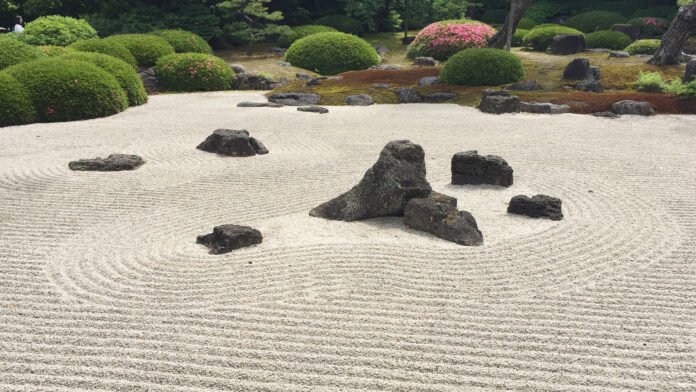Zen gardens, deeply rooted in Japanese culture, hold symbolic meanings behind their common elements, reflecting principles of Zen Buddhism and nature’s harmony, especially in home décor.
The sand or gravel in a Zen garden represents water or the ocean, symbolizing calmness, purity, and simplicity. Raked in patterns resembling waves or ripples, it encourages contemplation and meditation, fostering a sense of tranquility and mindfulness.
Rocks, another prominent feature of Zen gardens, carry symbolic significance. Larger rocks represent islands or mountains, while smaller rocks symbolize boats or trees. Arranged strategically, they evoke a sense of balance, stability, and harmony, reflecting the interconnectedness of all things in nature.
Moss, often found growing between rocks or alongside pathways, represents resilience, adaptability, and perseverance. Its lush greenery adds a touch of vitality and serenity to the garden, connecting visitors with the earth and inviting them to reflect on the cycle of life and renewal.
Bamboo, commonly used for fencing or as a backdrop in Zen gardens, symbolizes strength, flexibility, and resilience. Its graceful swaying in the wind embodies the concept of “shizen,” or naturalness, reminding observers to embrace change and flow with the rhythms of life.
Water features, such as ponds or streams, symbolize purity, clarity, and the continuous flow of life. They provide a focal point for contemplation and reflection, inviting visitors to pause and connect with their inner selves amidst the hustle and bustle of everyday life.
Bridges, often made of stone or wood, represent the journey from ignorance to enlightenment. Crossing a bridge in a Zen garden symbolizes the transition from one state of mind to another, encouraging self-reflection, growth, and transformation.
Plants and trees, carefully selected and pruned to create a sense of balance and harmony, symbolize resilience, endurance, and the impermanence of life. Their ever-changing foliage reflects the passage of time and the cyclical nature of existence.
Stones and pebbles, meticulously arranged in patterns or clusters, represent islands, mountains, or other natural formations. Each stone is carefully selected and placed to create a sense of balance and harmony, encouraging contemplation and reflection. The act of arranging stones in a Zen garden is considered a meditative practice, fostering mindfulness and focus.
Pathways, whether made of gravel, stepping stones, or wooden planks, symbolize the journey of life and the path to enlightenment. Walking along these pathways encourages mindfulness and self-awareness, guiding visitors on a spiritual journey of self-discovery and inner peace.
Tea houses or meditation pavilions, often found in larger Zen gardens, provide a tranquil space for reflection, meditation, and tea ceremonies. These structures are designed to blend seamlessly with the natural surroundings, creating a harmonious environment conducive to relaxation and contemplation.
The minimalist design aesthetic of Zen gardens reflects the principles of simplicity, elegance, and purity. By eliminating unnecessary clutter and distractions, Zen gardens create a sense of spaciousness and serenity, allowing visitors to focus on the present moment and find inner peace.
The symbolic meanings behind common elements of Zen gardens reflect profound philosophical principles and spiritual teachings. Whether in traditional Japanese gardens or modern home décor, these elements serve as reminders to cultivate mindfulness, harmony, and inner peace in our daily lives. By embracing the symbolism of Zen gardens, we can create environments that nourish the soul and inspire a deeper connection with ourselves and the natural world.

